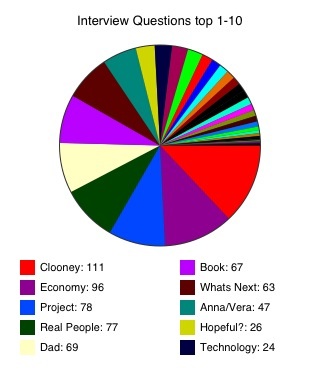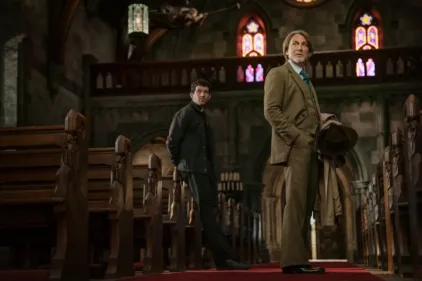Jason Reitman spent much of November hopping around the continent on a promotional tour for his wonderful new film, “Up in the Air.” Wicked devil that he is, he spent part of each day making notes on the questions he was being asked, and noticing that everyone seemed to ask the same questions. Thank God I didn’t know this when I interviewed him. I might have seized up.
Late in the month, he issued a handy pie chart that reflected all the questions. But first a word from your writer. “Up in the Air” is currently in a tie with “Precious” as the #1 Best Picture favorite by the Gurus o’ Gold, a panel of 15 Hollywood experts. It stars George Clooney in a subtle and sensitive performance as a road warrior who spend most of his time in airplanes, and likes it that way. Vera Farmiga plays the fellow traveler with whom he’s had a long-standing affair. Anna Kendrick is the intensely ambitious fresh college graduate he takes on as a trainee.
No, he doesn’t seduce her. It’s not that kind of story. He mentors her. Their jobs aren’t threatened by hard times: They’re “dismissal specialists.” They fire people on behalf of companies. The movie opens Friday, Dec. 3, and I might as well tell you I’m giving it four stars.
Now to the pie chart which ran on his Twitpic page. Here were the top finishers among the questions Jason logged:
1. What’s it like working with Clooney? 111
2. Timely, in view of the economy? 96
3. What attracted you to this project? 78
4. Real people played some of the people being fired? 77
5. Your dad is the famous producer-director Ivan Reitman? 69
6. The book it’s based on? 67
7. What is your next project? 63
8. Working with Anna and Vera? 47
9. Hopeful? 26
10. Technology? 24
The last two are ambiguous and Reitman doesn’t explain them. I could have predicted the other eight. I mean, give a guy a break. Does the interviewer come in and announce, “I’m not asking you about Clooney, unemployment, your dad, the book it’s based on, Farmiga or Kendrick, and I don’t give a damn about your next project!”? At that point, Reitman should get up and say, “Hello, I must be going.”
My own basic questions were prepared in advance and were typed in for my computer’s voice. I gather by this point in the tour every interviewed sounded to Reitman like a computer. I have been through many more of these ordeals than young Reitman, and I could make up a pie chart of the answers.
Here’s just one example of a standard answer: “Working with Clooney was… I’m telling’ you man. He’s a great guy and a great actor. He’s got it all. He can play a love scene, and he can handle a machine gun. And he’s smart…” etc., etc.
Here was my actual question: “George Clooney can do comedy, he can do romance, he can do drama. Here I think we see Cary Grant in ‘Death of a Salesman.’ ”
Now Reitman is very smart. This is the same young guy who directed “Thank You for Smoking” and “Juno.” Three movies, three terrific ones. Here was his actual answer:
“We all know how charming he is, we all know how smart he is and how altruistic he is. But I’ve never seen him actually fall in love in a real way. The last time he actually kissed a woman on screen was ‘Out of Sight.’ I mean, he kinda kissed, you know, Julia Roberts in the ‘Ocean’s Eleven‘ movie but really like kissed the girl in ‘Out of Sight,’ and even then he was in complete control of that relationship. I wanted to see that man out of control.
“I wanted to make a film about discovering the importance of companionship through loss. There’s plenty of movies where you can watch two people on screen and see them be romantic and think — oh, you know what? I want that too. But I wanted to make a movie where the kisser realizes that he can’t have the girl that he feels for, and we as the audience, feel his need for companionship, need for something else.
“The big question was whether or not he was gonna do that, whether he was gonna be willing to do that. And on Day 2, we shot the scene of him on that monorail in the airport where he’s on the phone with Vera Farmiga and she calls him a ‘parenthesis’ in her life. That’s a big scene to do on Day 2. I mean, this is my first movie with a real movie star and it’s Day 2 of shooting and now I’m asking him to the thing that I’ve wanted to see him his whole career that he’s never done and, look, I wish I could sit here and tell you that it was my great directing that kinda yanked it out of him but on Take 2 he just did it and he knew exactly what I wanted and I guess that’s part of the thing of George is, he’s a director. He’s an actor who thinks like a director and he’s fully aware of what I want and at that ‘cut’ moment it’s just a question of whether he’s willing to give it to me. And as soon as he trusts you, he’ll give you anything.”
[Plot spoilers follow.]
So that’s a good answer. Even better, it’s a real answer. Later I asked, “I find Vera Farmiga very warm and appealing. Given what we discover about her, thinking back, I realize you wanted to underline those qualities to set up the big revelation.” And Jason replied:
“It is a bit of a magic trick and I’m telling you to look over here so I can pull the rug from out under you. I didn’t wanna say there was anything wrong with this woman. I didn’t wanna judge her character. In a strange way she didn’t break the rules of that relationship; he broke the rules. They had basically signed up for something very specific and he wanted something more that they had never agreed upon.
“So I think she’s a human being; perhaps not the kind of human being you’d wanna basically get involved with but a human being kinda nonetheless and what’s great about her as an actress is that Vera was able to approach this without judging her character either. I would imagine as an actor to empathize with your character if your character is — um — kind of cruel, not to judge them. It’s a tricky job. I’m not sure how many actresses can do that. Play a sexy woman who’s just as masculine as she is feminine, is in complete control of her sexuality, really a woman, not a girl.”
[Spoilers past.]
Me: “You have a feeling for lovable women in their 30’s, also including Jennifer Garner in ‘Juno.’ It seems you’re more genuinely interested in adults in general, and adult women in particular, than most directors, especially young ones.”
Jason: “That’s very intuitive of you. When I was 16, I started dating a woman who was 25 and I moved in with her while I was still in high school. I cannot even begin to tell how upset this made my family. I stayed in high school but I got a job and I began living with the woman and I was with her for 7 years. I went from 16 to 23 and she went from 25 to 32. And my own wife now is also older than I am.
“I’ve always been curious about older women and an obsession with really smart women; women who were just too smart for their own good, who were burdened by their own intelligence. And as I’ve gotten older, I’m now beginning to recognize the same traits in younger brilliant women like Anna’s age who get out of college, think they have the entire world down, think they’ve just got it all and are frustrated by the fact that no one’s quite as right as them and no one moves as fast as they do.
“I found something really interesting about how the feminist movement has left women over the last 10-20 years. For the first couple of years women were told, ‘You can do anything; you can do anything you want; we’ve paved the road for you.’ And you realize at a certain point that there’s no such thing as life without sacrifice, that you can’t actually have everything, and feminism also brought them a new sort of mid-life crisis. That my own life experience, where my first serious relationship was a career woman; she got a business degree. And when I met my wife, she said, ‘I like puppies, not babies.’
“Then you know, she became a mother — and it’s like, you know, she still wants to be a career woman and she still hangs onto her Blackberry and her laptop and she’s an incredibly sweet, nurturing, woman. Women are going through a kind of new experience now. I felt that it hadn’t properly been explored on film and I thought it would be interesting to take Anna and Vera and have two women who are at two different moments. Vera looks at Anna and she sees herself 15 years ago and Anna is at that moment for a girl in her 20’s who’s no way ready to admit it but in the back of her head realizes that there’s gonna be a moment where she has to face the fact that she can’t have everything she wants. And it’s an incredibly cruel life moment and it’s sad and beautiful and it’s funny and that’s what I wanted to explore.”
Pretty good answers, wouldn’t you say? I didn’t get around to Technology, his dad and whether he’s hopeful. I said, “Hello, I must be going. I want me a slice of pie.”
See my blog entry, “Jason Reitman’s pie chart, and my slice.”












